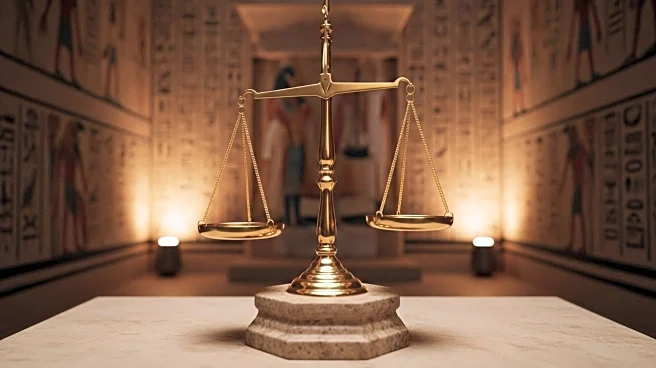What's Happening?
Egyptian President Abdel Fattah al-Sisi has pardoned Alaa Abd el-Fattah, a prominent Egyptian-British activist and blogger known for his role in the Arab Spring uprising. Abd el-Fattah, who has spent nearly a decade in prison, was serving a five-year sentence imposed in December 2021 for sharing a social media post about a prisoner's death. His release follows repeated campaigns by his family and pressure from the British government. Abd el-Fattah's mother, Laila Soueif, had recently resumed a hunger strike in protest of his detention. The pardon comes after Sisi ordered authorities to study Abd el-Fattah's release, marking a significant development in Egypt's human rights landscape.
Why It's Important?
The pardon of Alaa Abd el-Fattah is a significant event in Egypt's political and human rights context. Abd el-Fattah has been a symbol of the struggle for democracy and human rights in Egypt, and his release may signal a shift in the government's approach to dissent. Human rights groups have criticized Egypt for detaining tens of thousands of prisoners of conscience, often without due process. The decision to pardon Abd el-Fattah could be seen as a response to international pressure and criticism, potentially impacting Egypt's relations with Western countries and human rights organizations. It may also influence the broader political climate in Egypt, affecting activists and opposition groups.
What's Next?
Following the pardon, Alaa Abd el-Fattah is expected to be released from Wadi al-Natrun prison once the official gazette publishes the pardon. His release may lead to increased scrutiny of Egypt's human rights record and further pressure on the government to address the detention of other political prisoners. The National Council for Human Rights has welcomed the pardons, suggesting a growing commitment to justice and fundamental rights. The international community, particularly the UK, may continue to monitor Egypt's actions regarding human rights and political freedoms, potentially influencing diplomatic relations and foreign policy.
Beyond the Headlines
Alaa Abd el-Fattah's release highlights the complex interplay between political activism, human rights, and government authority in Egypt. His case underscores the challenges faced by activists in authoritarian regimes and the role of international advocacy in securing their freedom. The pardon may also reflect internal political dynamics within Egypt, as President Sisi balances maintaining control with addressing international criticism. The long-term implications for Egypt's political landscape and civil society remain uncertain, as the government navigates pressures both domestically and abroad.











